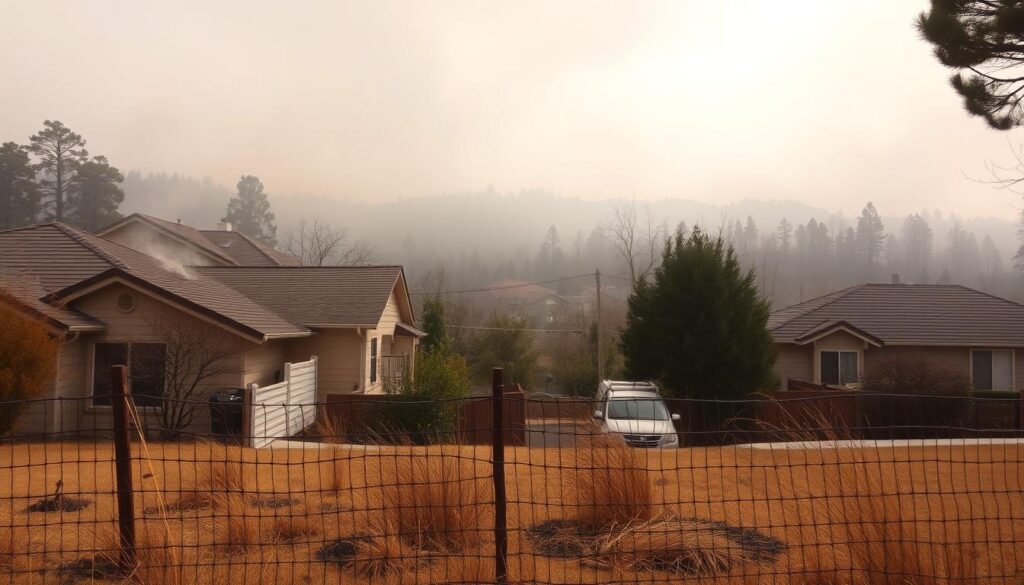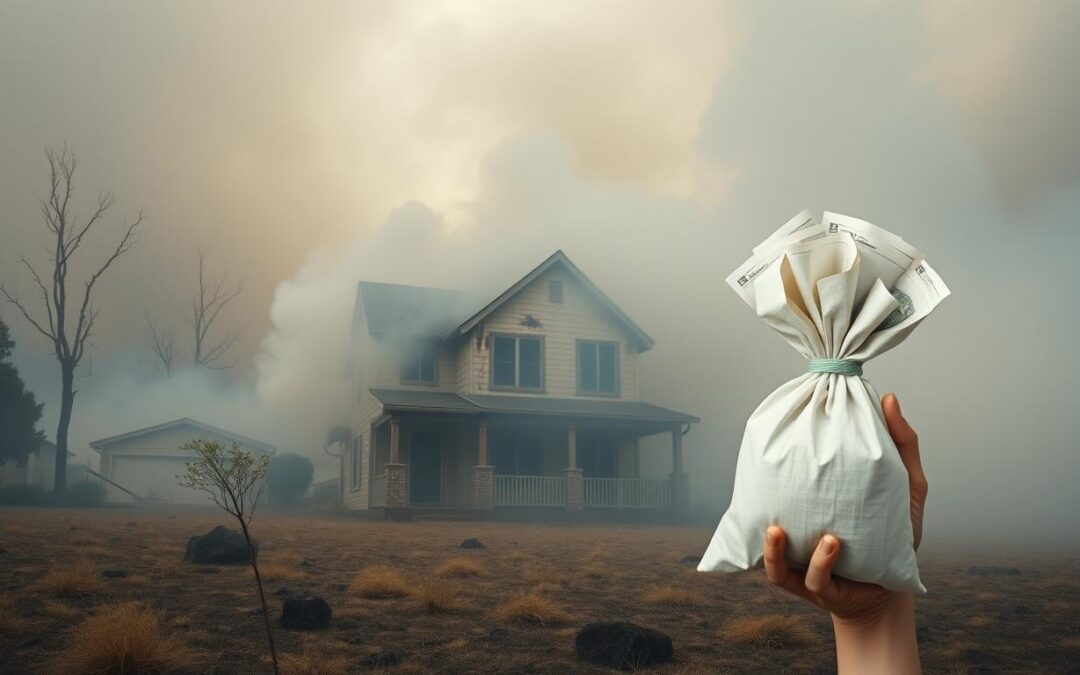Acting quickly is key to dealing with smoke damage. This helps us protect our property and make a strong claim.
Understanding How Wildfire Smoke Can Cause Damage
Wildfire smoke is a big threat to both our homes and our health. It can leave soot and ash everywhere, making cleanups and repairs very expensive. These particles can get into our HVAC systems, wallpaper, furniture, and even electronics, making them useless or damaged.
This shows why we need good wildfire smoke insurance coverage to protect our money.
Another big problem is how wildfire smoke can make the air inside our homes and businesses very bad. This bad air can harm our homes and our health over time. A study by the National Institutes of Health found that the pollutants in wildfire smoke can hurt our breathing, making asthma and COPD worse.

To get the right help for wildfire smoke damage, we need to know how it harms us. When we file a claim, we should list all the damage, like soot and ash, bad air, and health problems. Knowing all the damage helps us get the right repairs and health care, making recovery better.
Can I Claim Damage From Wildfire Smoke?
Many homeowners wonder, can I claim damage from wildfire smoke? Figuring out if you can get reimbursement can be tough. But, there are signs and rules that can help you know if you qualify. First, you need to check if your property has smoke damage.
Looking for physical signs of smoke damage is key. This might include ash, stains, or a strong smoke smell in your home. Also, any harm to your HVAC, walls, ceilings, or belongings should be well-documented. These are common signs that can lead to a claim.
Here is a table that highlights the common indicators and accepted conditions for a wildfire smoke damage claim:
| Indicator | Description | Accepted Condition |
|---|---|---|
| Residue | Visible collections of ash or soot on surfaces | Yes |
| Discoloration | Staining or discoloration on walls, ceilings, and floors | Yes |
| Odor | Persistent smoke smell throughout the property | Yes |
| HVAC System | Damage or contamination to air filters and ducts | Yes |
| Personal Property | Smoke-damaged furniture, electronics, or valuables | Yes |
Before you start the process of seeking reimbursement for wildfire smoke damage, check your insurance policy. Most insurance companies need clear evidence of damage. So, having solid documentation is crucial for a successful claim.
Steps to Filing a Wildfire Smoke Damage Insurance Claim
Filing a wildfire smoke damage claim can be complex. To succeed, follow a clear plan. We’ll guide you through the wildfire smoke damage claim process step by step.
Reviewing Your Insurance Policy
Start by reviewing your insurance policy carefully. Know what your wildfire smoke coverage includes and excludes. This helps you understand what’s covered and what’s not.
Documenting the Damage
Good documentation is key. Take detailed photos and videos of the damage. Make lists of damaged items, noting their condition before and after the damage. This evidence is crucial for your claim.
Contacting Your Insurance Provider
After reviewing your policy and documenting the damage, contact your insurance. Tell them about the wildfire smoke damage and start the claim. Quick action is important, as some policies have time limits.
Submitting the Claim
The last step is to submit your claim. Make sure all forms are filled out correctly and include all documents. Follow up with your insurance to confirm they received it and address any extra requests.
Common Challenges in Wildfire Smoke Damage Claims
When dealing with wildfire smoke damage claims, many face big hurdles. One major issue is proving that smoke damage caused the harm. Insurance companies need strong evidence, like photos and expert opinions, to accept these claims.
Another big problem is disagreements over claim value. Insurers might say the damage is less than you think, causing delays. Having detailed records and expert opinions can help solve these issues.
Claims can also take a long time to process. This might be because of too many claims or internal issues. To speed things up, keep in touch with your insurance and send all needed documents quickly.
To tackle these challenges, let’s look at some common problems and how to fix them:
| Challenge | Solution |
|---|---|
| Proving Damage | Collect comprehensive evidence, such as photos and expert reports. |
| Disputes Over Claim Value | Obtain independent assessments to support your claim. |
| Claims Processing Delays | Maintain consistent communication with your insurer and meet all documentation requirements. |
Knowing these common challenges helps us deal with the wildfire smoke damage claim process better. Being well-prepared and persistent is crucial for getting the compensation for wildfire smoke damage you deserve.
Wildfire Smoke Damage and Insurance Coverage
It’s key for homeowners, renters, and business owners to grasp insurance coverage for wildfire smoke damage. The options available can greatly affect your claim’s outcome.
Types of Policies That May Include Coverage
Several insurance policies might cover wildfire smoke damage:
- Homeowners Insurance: Covers damage to the home and belongings from wildfire smoke.
- Renters Insurance: Protects personal items in a rental against smoke damage, but not the building itself.
- Business Insurance: Covers commercial properties, including equipment and stock, harmed by smoke.
Coverage Limits and Exclusions
Knowing about coverage limits and exclusions is crucial when filing a claim:
| Policy Type | Typical Coverage Limits | Common Exclusions |
|---|---|---|
| Homeowners Insurance | Covers up to the policy’s limit for dwelling and personal property | Excludes certain smoke damages if the policyholder failed to mitigate risks |
| Renters Insurance | Up to the personal property coverage limit | May exclude high-value items unless specifically listed |
| Business Insurance | Varies by policy, often high limits for valuable business assets | Excludes damages due to negligence or improper maintenance |
Insurance policies vary widely, so understanding your coverage is essential for a successful claim. Review your policy and talk to your insurance provider to navigate the claim process effectively.
Legal Rights and Seeking Compensation for Wildfire Smoke Damage
Dealing with wildfire smoke damage means knowing our legal rights. Policyholders have rights under their insurance contracts and state laws. These rights help ensure fair treatment and compensation during claims.
It’s key to understand these rights. Insurance policies explain how to file claims for smoke damage. Knowing this helps us deal with the claims process better, making sure our claims are valid.
Next, we need to document our claim well. Photos, videos, and detailed notes about the damage are crucial. We must show how the wildfire smoke caused the damage. This increases our chances of getting compensation.
It’s also vital to know state laws that affect claims. Each state has its own rules that might help homeowners affected by wildfire smoke. Knowing these laws helps protect our rights fully.
In some cases, getting legal help is wise. Lawyers who specialize in insurance claims and wildfire damage can be very helpful. They can help negotiate with insurance companies, ensuring we get fair compensation without legal hassle.
To wrap it up, understanding our legal rights, documenting damages well, and using state laws are key. This way, we can get the compensation we deserve after a wildfire.
What to Do If Your Claim is Denied
Getting a denial for your wildfire smoke damage claim can be tough. But, knowing why it was denied and what to do next can help. This can improve your chances of getting the decision changed.
Understanding the Denial Reasons
First, find out why your claim was denied. Reasons include not enough proof of damage, filing too late, or policy exclusions. Read the denial letter carefully to understand the insurer’s reasons.
Appealing the Decision
If you think the denial was unfair, appeal it. Gather more evidence like photos, repair estimates, and expert opinions. Make sure to follow the insurer’s appeal process, as it’s usually in the denial letter.
Seeking Legal Counsel
If appealing doesn’t work, consider a lawyer. An experienced attorney can help with wildfire smoke insurance issues. They might help you get a settlement. Grun Law Corporation offers legal advice and can guide you.
Knowing your rights and taking action can help a lot with claim denials. By understanding the denial, appealing, and possibly getting a lawyer, you can get the compensation you need.
Successful Wildfire Smoke Damage Settlements: Real-Life Examples
Dealing with wildfires can be tough. But knowing others have won their claims can give hope. Many have fought for their rights and won, showing that with the right steps, you can too.
A family’s home was badly damaged by smoke from a wildfire. They worked hard to show the damage and got help from lawyers. Their hard work led to a settlement that helped them fix their home and cover extra costs. This shows how important it is to document everything and get expert help.
Businesses can also win their claims. A small business owner lost money because of smoke. They showed how much they lost by keeping detailed records. This led to a big settlement, proving the value of keeping good financial records.
These stories show that you can get financial help after a wildfire. It’s all about knowing your rights, preparing well, and getting the right advice. For more help and examples, check out this source.
Consult with Grun Law Corporation
If your property is damaged by smoke, Grun Law Corporation offers a free consultation to help you understand your legal options. With deep experience in California property damage law, their team can guide you through the process, from handling damage assessment reports to securing compensation.
Don’t navigate a smoke damage case alone. Call Grun Law Corporation at (818) 433-7742 for expert advice that protects your rights and prioritizes your interests.

